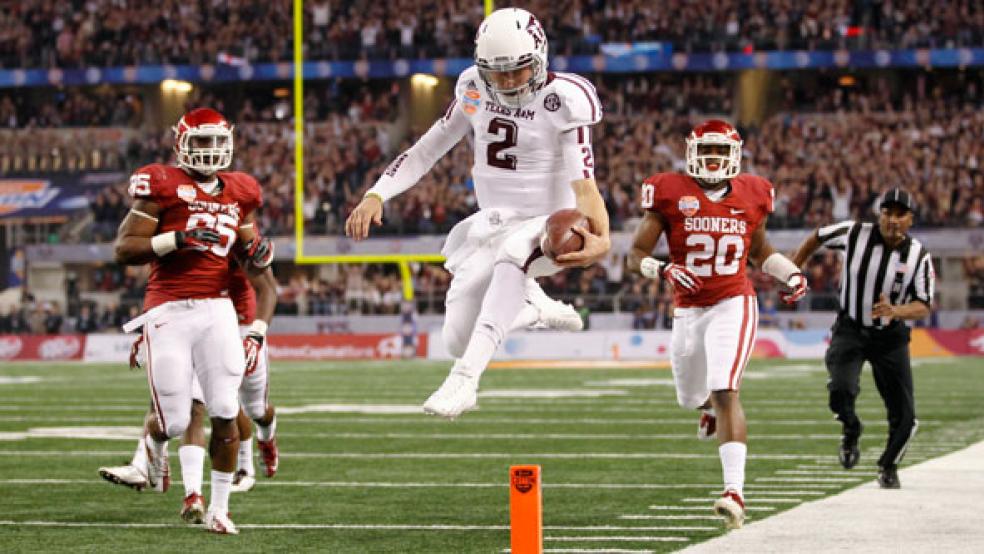The curtain is set to rise on another college football season tonight when the University of South Carolina Gamecocks host the University of North Carolina Tar Heels. But the first act of the new college football season actually opened in College Station, Texas, late Wednesday afternoon.
That’s where Texas A&M’s Heisman Trophy-winning quarterback Johnny Manziel, otherwise known as Johnny Football, as every fan knows, was suspended by the NCAA for the first half of this Saturday’s game against Rice University, his season opener. The NCAA looked into allegations made by anonymous sources in a series of ESPN reports that Manziel asked for money to sign some 4,000 pieces of memorabilia that ranged from footballs to helmets to posters.
The NCAA wasn’t able to find any proof that Manziel accepted cash payments, and ESPN quoted only anonymous sources – hence the light 30-minute suspension. But the incident is the latest instance of how others, from schools to television networks to the NCAA and now autograph brokers – make money off college athletes while those very athletes are prohibited from making money for themselves.
RELATED STORY: The Business of College Football: Who’s Winning?
It also comes at a time when there is a growing consensus that the NCAA, which allows its own organization and participating schools to reap the financial rewards of their athletes’ cheap labor, is coming to an end. Current and former players have sued the NCAA for exploiting the unlicensed use of their names on jerseys, posters and in video games.
“There’s a lot of money that a few people are making off the backs of these athletes,” according to David Ridpath, an associate professor of sports administration at Ohio University. “At the very least, they deserve a reasonable stipend for all they do for the university because we do use them as marketing tools. They should be allowed to capitalize on their marketing utility.”
Not incidentally, the NCAA generated $841 million in revenue in 2011-2012, according to a Bloomberg report on Tuesday.
MAKING A MINT OFF JOHNNY FOOTBALL
Nearly everyone has been making money off Johnny Manziel except Johnny Manziel. Texas A&M recently auctioned a dinner with him for $20,000. When news of the investigation broke, ESPN analyst and lawyer Jay Bilas pointed out that a search of his name at the NCAA online store directed users to a page where they could spend upwards of $100 for his jersey (the search function was removed when Bilas’s Tweets went viral). Manziel went as far as to copyright the nickname “Johnny Football,” given to him by football-mad Texas A&M alums, when people started to use it to generate cash for themselves.
The Manziel investigation has exposed the sports world to another group that profits from the hard work, dedication and huge time commitment of college athletes: autograph brokers. They act as intermediaries between athletes and sports memorabilia convention companies like Steiner Sports, which sells memorabilia online and at conventions. Mike Gallucci, vice president of operations at sportsmemorabilia.com, says the sports memorabilia industry generates $4 billion annually.
Joe Orlando, president of PSA/DNA sports memorabilia verification services, claims that pro athletes are paid to sign items and that they receive a commission on the sale of the memorabilia. For many of them, especially the older athletes who played in the days before huge salaries, this provides a steady stream of income.
“People forget how little Mickey Mantle and Joe DiMaggio made despite how popular and great they were,” he said. “The athletes who played before the big surge are able to generate more money simply by signing autographs than by playing the games they loved.”
This arrangement works fine in the pros, but is illegal in college because the NCAA forbids players from profiting from their own names and likenesses. This means that the autograph brokers and sports memorabilia firms make money while the athletes who are doing the signing get nothing.
And from the looks of it, these brokers and memorabilia companies are doing well. There are hundreds, if not thousands, of items signed by stars like South Carolina defensive end Jadeveon Clowney (many are signed pictures of this devastating hit) and Alabama quarterback A.J. McCarron.
As of Wednesday night, a helmet signed by Manziel is selling for $1,252 on sportsmemorabilia.com. A football signed by Clowney goes for $199.99 on Ebay. A signed picture of A.J. McCarron is priced at $693 on Amazon.
There are thousands of these items for sale and all of the profit goes to brokers and memorabilia companies. College athletes get nothing.
AN END TO NCAA HYPOCRISY?
Ohio University’s Ridpath said the NCAA’s double standard has been exposed too many times to last much longer. He said he expects athletes to receive some form of compensation in the near future.
“We live in a capitalistic society but the NCAA laws restricts these athletes,” he said. “Some of the kids out there playing football are doing it so they can go to school. But there are kids here just to play football and the fans don’t care.”
Ridpath also correctly predicted that Manziel would get off easy, even if the NCAA were able to prove he took money. The reason? Texas A&M is scheduled to play defensive national champion Alabama on Sept. 14. Riding a spectacular performance from Johnny Football, the Aggies upset the Crimson Tide last year. Fans, ESPN – which will be broadcasting from College Station the day of the game – and the NCAA are already billing the rematch as the game of the century.
Cheap seats for the game are currently selling for $744. All told, if Manziel by some chance were to sit, direct ticket sales prices would plummet, taking money out of the university’s and the NCAA’s pockets, while ratings would tumble, hitting ESPN and other networks.
“I don’t think the NCAA has the stomach to sit Johnny Manziel,” said Ridpath.



